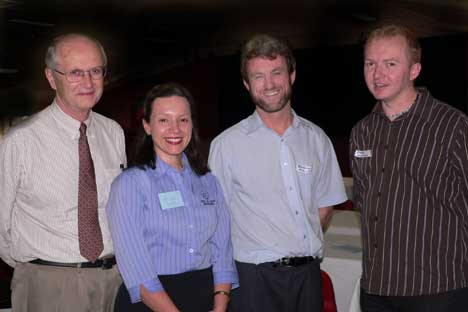On Friday afternoon I was part of a panel responding to Dean Hoge’s lecture on young adults in the Catholic Church. Dean’s a Presbyterian who’s been lecturing in sociology of religion at the Catholic University of America in Washington DC for thirty years. He was part of the team that published the 1994 book, “Vanishing Boundaries: The Religion of Mainline Protestant Baby Boomers”. On Friday Dean was presenting research on Catholic young adults in the United States, to an audience consisting mostly of Catholic educators and youth ministry staff from Brisbane.

There were some eye openers for me. The top two values in a 1997 survey of Catholics 20 to 39 years old, relating to Catholic distinctiveness, were belief that God is present in the sacraments (no surprise), and a charitable efforts toward helping the poor (interesting). Fourth on the list was devotion to Mary the Mother of God. Emerging values identified in teenagers and young adults included a commitment to short-term projects and a strong will to protect the environment.
Dean took us through a national sample of American Catholics held in 2003, looking at issues of individual conscience and Catholic teaching, ethics relating to homosexual acts, abortion, pre-marital sex and birth control. It was clear that there was a strong delineation between Pre-Vatican II Catholics (63 years and older) and post-Vatican II Catholics (40-62 years of age). Young adults (18-39) were quite similar to the latter. Clearly a lot of the difference was related to generational change, particularly in the emergence of the Baby Boom generation.
Dean talked about the challenge faced by liberal denominations like the PCUSA and Uniting Church in Australia when it comes to identity. As denominations we highly value individual capacity for discernment, education and decision making. We are loathe to tell young adults what to do and believe. Some young adults stay around for that very reason. However many drift off because they perceive to be vagueness in doctrine and distinctiveness. The Uniting Church in Australia does not have much connection with the narratives told by the Methodists, Presbyterians and Congregationalists in earlier years. We focus so much on being accessible and inclusive to Christians of all varieties that we’re in danger of being a generic brand, standing for nothing much.
My response included a reference to brand loyalty among emerging generations. People like Kevin Roberts at Saatchi and Saatchi prefer to talk about love than loyalty, thus the phrase “Love Marks”. We see that at work in the emotional connection many young Australian Christians have with Hillsong. I referred to Pope John Paul II and his inclusion in the Love Marks web site, between Pop Secret (pop corn) and Porsche. We have the challenge of nurturing passion that goes beyond consumerism, modelling this capacity for love in our own lives. I pointed out that organisations like Greenpeace found a following in the Baby Boom generation when a group of people now in their late sixties committed themselves to sharing their vision with students and workers ten years younger than themselves.
Young Adult Catholics: Religion in the Culture of Choice (2001) at Amazon.com
Dean Hoge is pictured above (left) with my fellow panel members Selina Harris (Sunnybank Catholic Parish) and Paul Mergard, (right) photographer and Salvation Army church planter in West End, Brisbane.
